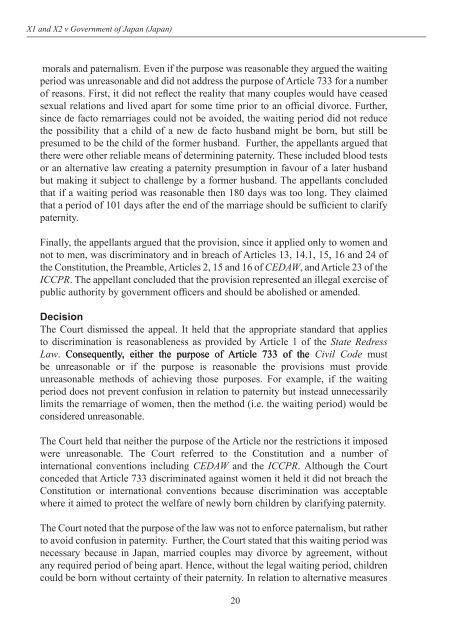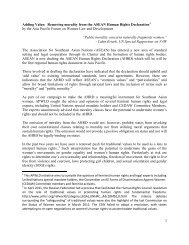A Digest of Case Law on the Human Rights of Women - Asia Pacific ...
A Digest of Case Law on the Human Rights of Women - Asia Pacific ...
A Digest of Case Law on the Human Rights of Women - Asia Pacific ...
You also want an ePaper? Increase the reach of your titles
YUMPU automatically turns print PDFs into web optimized ePapers that Google loves.
X1 and X2 v Government <str<strong>on</strong>g>of</str<strong>on</strong>g> Japan (Japan)<br />
morals and paternalism. Even if <strong>the</strong> purpose was reas<strong>on</strong>able <strong>the</strong>y argued <strong>the</strong> waiting<br />
period was unreas<strong>on</strong>able and did not address <strong>the</strong> purpose <str<strong>on</strong>g>of</str<strong>on</strong>g> Article 733 for a number<br />
<str<strong>on</strong>g>of</str<strong>on</strong>g> reas<strong>on</strong>s. First, it did not reflect <strong>the</strong> reality that many couples would have ceased<br />
sexual relati<strong>on</strong>s and lived apart for some time prior to an <str<strong>on</strong>g>of</str<strong>on</strong>g>ficial divorce. Fur<strong>the</strong>r,<br />
since de facto remarriages could not be avoided, <strong>the</strong> waiting period did not reduce<br />
<strong>the</strong> possibility that a child <str<strong>on</strong>g>of</str<strong>on</strong>g> a new de facto husband might be born, but still be<br />
presumed to be <strong>the</strong> child <str<strong>on</strong>g>of</str<strong>on</strong>g> <strong>the</strong> former husband. Fur<strong>the</strong>r, <strong>the</strong> appellants argued that<br />
<strong>the</strong>re were o<strong>the</strong>r reliable means <str<strong>on</strong>g>of</str<strong>on</strong>g> determining paternity. These included blood tests<br />
or an alternative law creating a paternity presumpti<strong>on</strong> in favour <str<strong>on</strong>g>of</str<strong>on</strong>g> a later husband<br />
but making it subject to challenge by a former husband. The appellants c<strong>on</strong>cluded<br />
that if a waiting period was reas<strong>on</strong>able <strong>the</strong>n 180 days was too l<strong>on</strong>g. They claimed<br />
that a period <str<strong>on</strong>g>of</str<strong>on</strong>g> 101 days after <strong>the</strong> end <str<strong>on</strong>g>of</str<strong>on</strong>g> <strong>the</strong> marriage should be sufficient to clarify<br />
paternity.<br />
Finally, <strong>the</strong> appellants argued that <strong>the</strong> provisi<strong>on</strong>, since it applied <strong>on</strong>ly to women and<br />
not to men, was discriminatory and in breach <str<strong>on</strong>g>of</str<strong>on</strong>g> Articles 13, 14.1, 15, 16 and 24 <str<strong>on</strong>g>of</str<strong>on</strong>g><br />
<strong>the</strong> C<strong>on</strong>stituti<strong>on</strong>, <strong>the</strong> Preamble, Articles 2, 15 and 16 <str<strong>on</strong>g>of</str<strong>on</strong>g> CEDAW, and Article 23 <str<strong>on</strong>g>of</str<strong>on</strong>g> <strong>the</strong><br />
ICCPR. The appellant c<strong>on</strong>cluded that <strong>the</strong> provisi<strong>on</strong> represented an illegal exercise <str<strong>on</strong>g>of</str<strong>on</strong>g><br />
public authority by government <str<strong>on</strong>g>of</str<strong>on</strong>g>ficers and should be abolished or amended.<br />
Decisi<strong>on</strong><br />
The Court dismissed <strong>the</strong> appeal. It held that <strong>the</strong> appropriate standard that applies<br />
to discriminati<strong>on</strong> is reas<strong>on</strong>ableness as provided by Article 1 <str<strong>on</strong>g>of</str<strong>on</strong>g> <strong>the</strong> State Redress<br />
<str<strong>on</strong>g>Law</str<strong>on</strong>g>. C<strong>on</strong>sequently, ei<strong>the</strong>r <strong>the</strong> purpose <str<strong>on</strong>g>of</str<strong>on</strong>g> Article 733 <str<strong>on</strong>g>of</str<strong>on</strong>g> <strong>the</strong> Civil Code must<br />
be unreas<strong>on</strong>able or if <strong>the</strong> purpose is reas<strong>on</strong>able <strong>the</strong> provisi<strong>on</strong>s must provide<br />
unreas<strong>on</strong>able methods <str<strong>on</strong>g>of</str<strong>on</strong>g> achieving those purposes. For example, if <strong>the</strong> waiting<br />
period does not prevent c<strong>on</strong>fusi<strong>on</strong> in relati<strong>on</strong> to paternity but instead unnecessarily<br />
limits <strong>the</strong> remarriage <str<strong>on</strong>g>of</str<strong>on</strong>g> women, <strong>the</strong>n <strong>the</strong> method (i.e. <strong>the</strong> waiting period) would be<br />
c<strong>on</strong>sidered unreas<strong>on</strong>able.<br />
The Court held that nei<strong>the</strong>r <strong>the</strong> purpose <str<strong>on</strong>g>of</str<strong>on</strong>g> <strong>the</strong> Article nor <strong>the</strong> restricti<strong>on</strong>s it imposed<br />
were unreas<strong>on</strong>able. The Court referred to <strong>the</strong> C<strong>on</strong>stituti<strong>on</strong> and a number <str<strong>on</strong>g>of</str<strong>on</strong>g><br />
internati<strong>on</strong>al c<strong>on</strong>venti<strong>on</strong>s including CEDAW and <strong>the</strong> ICCPR. Although <strong>the</strong> Court<br />
c<strong>on</strong>ceded that Article 733 discriminated against women it held it did not breach <strong>the</strong><br />
C<strong>on</strong>stituti<strong>on</strong> or internati<strong>on</strong>al c<strong>on</strong>venti<strong>on</strong>s because discriminati<strong>on</strong> was acceptable<br />
where it aimed to protect <strong>the</strong> welfare <str<strong>on</strong>g>of</str<strong>on</strong>g> newly born children by clarifying paternity.<br />
The Court noted that <strong>the</strong> purpose <str<strong>on</strong>g>of</str<strong>on</strong>g> <strong>the</strong> law was not to enforce paternalism, but ra<strong>the</strong>r<br />
to avoid c<strong>on</strong>fusi<strong>on</strong> in paternity. Fur<strong>the</strong>r, <strong>the</strong> Court stated that this waiting period was<br />
necessary because in Japan, married couples may divorce by agreement, without<br />
any required period <str<strong>on</strong>g>of</str<strong>on</strong>g> being apart. Hence, without <strong>the</strong> legal waiting period, children<br />
could be born without certainty <str<strong>on</strong>g>of</str<strong>on</strong>g> <strong>the</strong>ir paternity. In relati<strong>on</strong> to alternative measures<br />
20



